
Chief Dawid Stuurman International Airport is an airport serving Port Elizabeth (Gqeberha), a city in the Eastern Cape province in South Africa. It was formerly known as H. F. Verwoerd Airport and Port Elizabeth International Airport. The airport is owned and operated by the Airports Company South Africa which also operates nine other airports around South Africa. The airport is located approximately two miles south of the city's central business district. In 2017, the airport served 1,620,705 passengers.
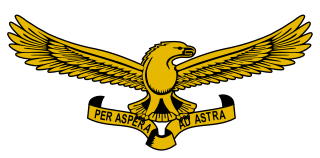
The South African Air Force (SAAF) is the air warfare branch of South African National Defence Force, with its headquarters in Pretoria. The South African Air Force was established on 1 February 1920. The Air Force saw service in World War II and the Korean War. From 1966, the SAAF was involved in providing infantry support in the low-intensity Border War in Angola, South-West Africa and Rhodesia. As the war progressed, the intensity of air operations increased, until in the late 1980s when the SAAF were compelled to fly fighter missions against Angolan aircraft in order to maintain tactical air superiority. On conclusion of the Border War in 1990, aircraft numbers were severely reduced due to economic pressures as well as the cessation of hostilities with neighbouring states.

The Denel Rooivalk is an attack helicopter manufactured by Denel Aviation of South Africa. Rooivalk is Afrikaans for "Red Falcon", which refers to the lesser kestrel. Development of the type began in 1984 by the Atlas Aircraft Corporation, its development is closely connected to the Atlas Oryx transport helicopter, both aircraft being based on the Aérospatiale SA 330 Puma and having started development at the same time.

The Atlas Oryx is a medium-sized utility helicopter ostensibly developed and manufactured by the Atlas Aircraft Corporation of South Africa. Its largest operator is the South African Air Force (SAAF), having been originally developed to fulfil their needs.
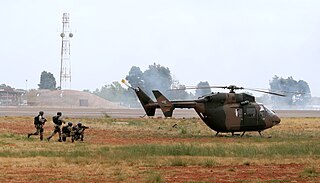
15 Squadron SAAF is a squadron of the South African Air Force. It is currently a transport/utility helicopter squadron.
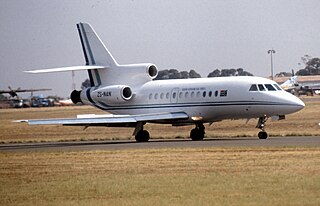
21 Squadron SAAF is a squadron of the South African Air Force. It was formed as a bomber squadron in Kenya during World War II and became a VIP transport squadron in the 1960s, a role which it performs to this day. The squadron currently flies two Dassault Falcon 50s, two Cessna Citation IIs, a Dassault Falcon 900 and a Boeing BBJ aircraft. 21 Squadron is one of the most active squadrons in the air force with 606 VIP transport flights being made between 2009 and 2012. The Boeing BBJ is used as the presidential aircraft when the President of South Africa travels and designated callsign LMG1.

87 Helicopter Flying School is a unit of the South African Air Force. It is a helicopter flight training school.
The Denel Dynamics Seeker is an unmanned aerial vehicle (UAV) manufactured in South Africa by Denel Dynamics. The system is designed to perform tactical reconnaissance in real time and can conduct day and night surveillance in all threat environments.
The South African Air Force Museum houses exhibits and restores material related to the history of the South African Air Force. The museum is divided into three locations, AFB Swartkop outside Pretoria, AFB Ysterplaat in Cape Town and at the Port Elizabeth airport.

Air Force Base Swartkop is South Africa's oldest air force base and houses the South African Air Force Museum. It is managed as part of AFB Waterkloof and houses one of the three branches of the South African Air Force Museum. The name of the air force base, Swartkop means Black hill in Afrikaans.

AFB Durban is an airbase of the South African Air Force, located in Durban, KwaZulu-Natal, South Africa. The runway is shared with the Durban International Airport. The airbase is at the northern end of the runway.

35 Squadron SAAF is a squadron of the South African Air Force. It is a maritime patrol and transport squadron.

12 Squadron was a South African Air Force squadron that served in the Second World War in East Africa and the Western Desert as a medium bomber squadron. After the war, the squadron was used in various roles, including that of a helicopter squadron until 1963, when it was equipped with English Electric Canberra light bombers, remaining a light bomber and reconnaissance squadron until disbanded in 1990.
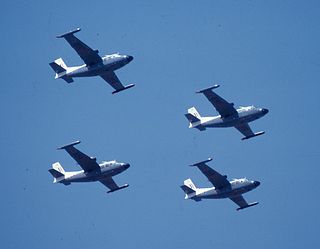
27 Squadron was established as a World War II maritime patrol squadron of the South African Air Force. It was disbanded after the war and resurrected in the same role from 1951 to 1958. Its final period of service was from 1962 to 1990 when it was finally disbanded when its Piaggio Albatross aircraft were de-commissioned.
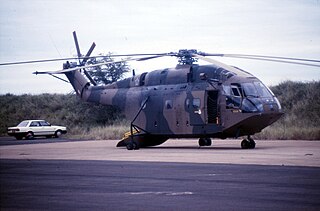
30 Squadron SAAF was a squadron of the South African Air Force. It was established in 1944 and saw service as a medium bomber squadron in Italy during the Second World War. After the war, the squadron was disbanded and was resurrected in 1980 as a medium transport helicopter squadron – a role it retained until it was finally disbanded in 1991.
The History of the South African Air Force spans the First World War, Rand Rebellion of 1922, the Second World War, the Korean War, the South African Border War, and varied peacekeeping operations since 1994. Its battle honours include German South West Africa 1914–15, German East Africa 1915–1918, East Africa: 1939–1941, Middle East: 1941–43, Madagascar 1942, Italy 1943–1945, the Balkans 1943–1945, and Korea 1950–1953.

42 Squadron SAAF is a disbanded squadron of the South African Air Force, active from 1945 to 2000. The squadron's main role was to spot enemy artillery. The unit was formed in 1945 as 42 AOP Flight, flying Austers under command of an officer of the SA Artillery and was the only army aviation unit flying for South African forces during World War II.
Southern Air Command was a formation of the South African Air Force, active from the early 1980s to the early 1990s. Throughout its existence, it had its headquarters at Silvermine, in the Cape Province.

16 Squadron SAAF is an attack helicopter squadron of the South African Air Force (SAAF). It was originally formed in World War II as a maritime patrol squadron, however, over the course of the war it was disbanded and reformed a number of times, operating a number of different types of aircraft. It was finally disbanded in June 1945 and was not re-raised until 1968 as a helicopter squadron. In the late 1980s the squadron took part in the conflict in Angola before being disbanded again in 1990. It was raised once more in 1999 and it is currently operating the Rooivalk attack helicopter.
















